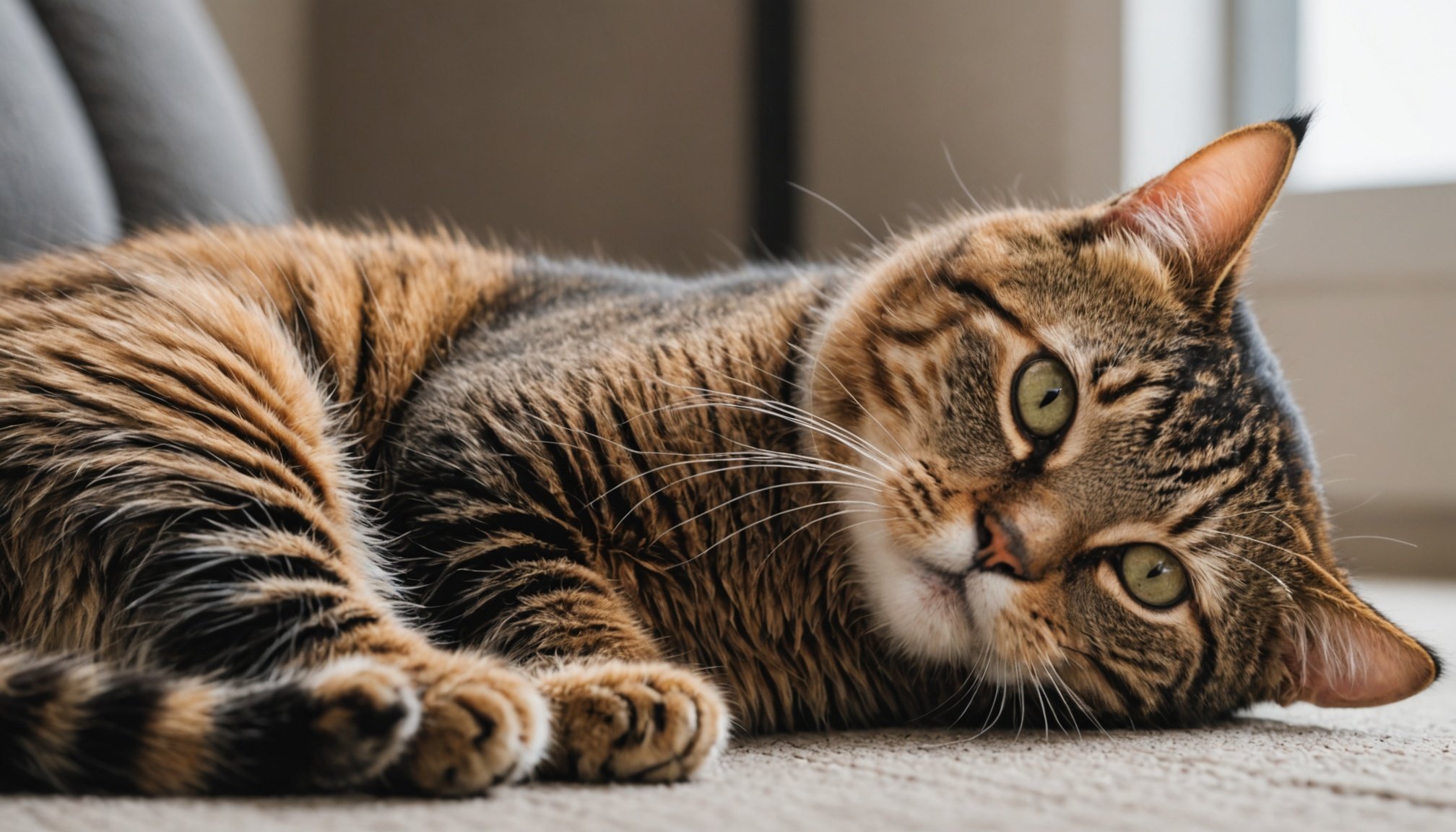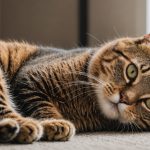Creating a Soothing Environment for Cats
Providing a calming cat space is fundamental to maintaining your feline’s well-being. Cats are particularly sensitive to their surroundings, and a stress-free zone can significantly impact their digestive health. A tranquil environment mitigates anxiety, promoting a healthier digestive system and reducing the likelihood of gastrointestinal issues.
When designing a calming cat space, one should consider the choice of bedding. Recommended options include cozy, plush cushions or heated beds that offer warmth and comfort. These selections cater to a cat’s natural instinct to seek snug, warm areas, thus enhancing relaxation.
Dans le meme genre : Transform Your Space: Crafting a Cat-Friendly Nap Zone that Aligns with Their Natural Sleep Patterns
Furniture placement is also crucial in stress reduction for cats. Strategically position furniture to avoid stress triggers, such as loud household appliances or high-traffic areas. Ensure easy access to elevated spots where cats can retreat and observe their surroundings, furthering stress reduction for cats through a sense of security.
Creating a nurturing environment for your feline companion requires thoughtful planning and attention to detail. By ensuring a calming cat space that prioritizes comfort and security, you’ll be contributing positively to their overall health and happiness.
Lire également : Essential Tips for Delivering Top-Notch Care to Cats Suffering from Feline Lower Urinary Tract Disease (FLUTD)
Optimal Bedding and Rest Areas
Creating the perfect resting spots for your feline involves selecting ideal cat bedding materials and ensuring cozy locales within your home. Cats are naturally drawn to soft and warm places, so understanding their preferences plays a pivotal role in their comfort.
Types of Bedding Materials
When choosing bedding, opt for materials that offer warmth and softness. Fabrics such as fleece or cotton are both cozy and breathable. It’s crucial to ensure that the material is washable, maintaining hygiene without sacrificing comfort. Safety is a top priority; avoid materials that could easily tear or cause entanglement.
Ideal Resting Locations
Consider placing beds in locations where cats feel safe and can peacefully observe their environment. Sheltered spots away from heavy traffic areas are often preferred. Cats appreciate height, so a high perch with a cozy bed can be a haven.
Incorporating Warmth and Softness
To enhance a bedding area’s warmth, consider layers of soft blankets or heated pads, especially during colder months. Maintaining multiple resting locations caters to a cat’s mood and inclination to switch spots throughout the day. Clean these areas routinely to provide a fresh and inviting rest space.
By focussing on these elements, you can create a series of inviting and comfortable areas for your cat to relax and thrive.
Strategic Litter Box Placement
A well-thought-out litter box setup can significantly enhance both the hygiene of your home and the well-being of your pet. One crucial factor is location. It’s best to place litter boxes in areas away from stressful environments, such as noisy or high-traffic zones. Cats appreciate privacy and solitude when doing their business, and noisy areas might cause them stress, leading to some avoiding the box altogether.
Consider quieter parts of your home, as they can provide the solitude your cat needs. A corner or a secluded area often works well. Remember that each cat is different, and some may have specific preferences.
Maintaining litter box hygiene is equally important. Regular cleaning, ideally once a day, not only promotes use but also keeps unpleasant odours at bay. Make a habit of thoroughly cleaning the litter box monthly to ensure it’s fresh for your cat. Ensuring that these factors are considered in your litter box setup benefits both your pet and your living environment.
Dietary Recommendations for Digestive Health
Understanding the digestive health of cats is crucial for their overall well-being. Recognising the role of their diet can help address potential issues and prevent more serious conditions.
Identifying Digestive Issues through Diet
Cats, like humans, may exhibit signs of digestive distress such as vomiting, diarrhea, or a noticeable change in appetite. Observing these symptoms can help correlate them with specific foods in their diet. A careful evaluation of their cat diet might reveal certain ingredients or food types that are triggers. Digestive health problems often manifest as increased sensitivity to particular proteins or additives.
Best Foods for Sensitive Stomachs
A diet formulated for cats with sensitive stomachs can be beneficial. Foods that are easily digestible and made from natural, whole ingredients often help. Some popular choices include:
- Limited ingredient diets that minimise potential allergens
- Foods that incorporate prebiotics and fibres to support gut health
Consultations with Veterinarians
Seeking expert advice is essential when symptoms persist. A professional will not only help diagnose the issue but also provide tailored dietary recommendations. Veterinarians can suggest specific food brands or the elimination of certain foods, ensuring the cat’s digestive health is well managed and promoting a balanced and nutritious diet.
Recognizing Signs of Digestive Distress
Understanding cat health signals is vital for any pet owner. Digestive problems in cats often manifest through common symptoms such as vomiting, diarrhea, or a lack of appetite. Observing these health signals can help identify distress early.
Behavioral changes might also suggest digestive issues. A normally playful cat that becomes lethargic or irritable may be experiencing discomfort. Similarly, if a cat suddenly starts hiding or avoiding contact, it could be an indication of underlying digestive problems. Cats are masters at masking pain, making it crucial to be attentive to any shifts in behavior that deviate from their norm.
The importance of prompt veterinary care cannot be overstated when dealing with potential digestive problems in cats. Delaying professional assessment could exacerbate the condition, potentially leading to more serious health complications. Consulting a vet ensures an accurate diagnosis and appropriate treatment, promoting the well-being of your feline friend.
Pay attention to these signals to maintain your cat’s health and catch any issues before they worsen. Early detection and intervention are key to managing and resolving digestive problems effectively.
Incorporating Stress-Reducing Elements
Creating a tranquil environment for your cat requires incorporating calming elements. Let’s explore the impact of these soothing interventions.
Use of Feline Pheromones
Feline pheromones are an effective solution for stress relief for cats. These chemicals mimic natural cat pheromones, which can comfort and reassure cats. Pheromone diffusers and sprays distribute these compounds into the air; they’re easy to use and non-intrusive. Such products can be especially beneficial during changes in the cat’s environment, like moving homes or introducing new pets.
Ambient Sound and Music Recommendations
Sound therapy can significantly contribute to calming elements in your home. Playing soft, classical music or specially composed pet music can lower anxiety levels. Studies suggest cats may respond positively to music that aligns with their vocal frequencies, providing a sense of security and relaxation.
Creating a Safe Space with Hiding Spots
Designing a dedicated area with hiding spots can offer significant stress relief for cats. Consider enclosed spaces like boxes or tunnels. These spaces cater to a cat’s natural instincts to retreat for safety, enhancing their comfort. Adding soft bedding or familiar toys will further amplify these calming elements.
Veterinary Interventions and Support Options
In managing your cat’s health, understanding when to consider medication is crucial. Stress can significantly impact a cat’s well-being, sometimes leading to digestive issues. If you notice behavioral changes or physical symptoms, it’s wise to consult with your vet about the potential use of medication. Medications can help alleviate stress-related symptoms, promoting overall health.
Alternative therapies can also be beneficial for digestive problems. Treatments such as probiotics, dietary adjustments, or herbal remedies offer non-invasive solutions. These alternatives often support traditional veterinary care, creating a comprehensive health management plan tailored to your pet’s needs.
Building a supportive relationship with your vet is an integral part of effective cat health management. Regular check-ups, open communication, and a collaborative approach ensure your cat receives the best possible care. By working closely with veterinary professionals, you can better navigate decisions around medications and alternative therapies, thus enhancing your cat’s quality of life.
Proactive veterinary involvement means you’ll be equipped to make informed choices, considering all aspects of your cat’s well-being. This collaboration ensures that both conventional and alternative strategies are optimally employed in maintaining their health.










